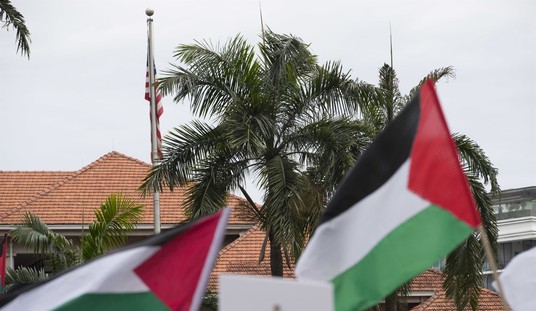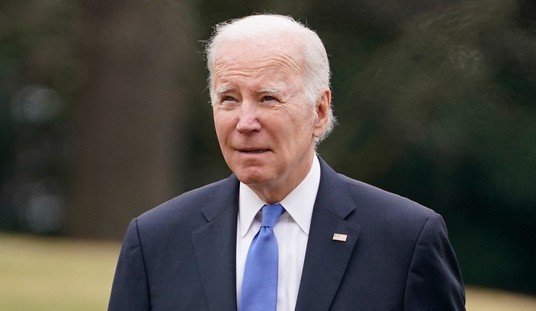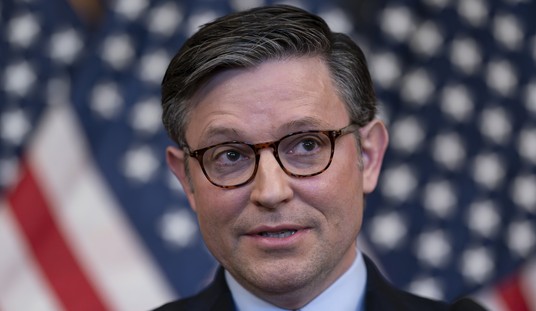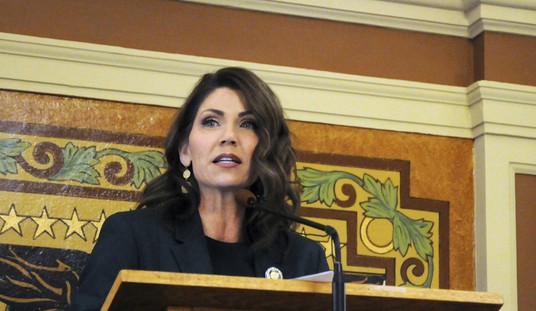=========
=========
Promoted from the diaries by streiff. Promotion does not imply endorsement.
=========
=========
If there’s anything that experienced Middle East analysts should’ve learned over the last few years, it’s that problems that seemed intractable can be overshadowed–and made irrelevant–by a changing environment.
By now, the story should be familiar to everyone: Barack Obama’s dangerous outreach to Shia Iran and Sunni Islamists caused America’s left-behind allies in Israel and the Sunni world to look to one another to counterbalance the mischief the president’s policies were causing. First, the Israelis and the Arabs allied to put the brakes on a Muslim Brotherhood sweep of the Middle East, and then to attempt to arrest Iran from engaging in its own brand of regional imperialism. Many of these countries, too, came to recognize the threat of Islamism, and have dealt with it forcefully.
For the first time, though, states like Saudi Arabia, Egypt and the UAE came to realize that Israel was a more humane, predictable, and powerful ally than any realistic Palestinian regime would be. Decades after military and diplomatic conflict that seemed to be intractable, these states have come to accept that their interests are better served by an Israel that exists and is strong than one that is weak, under siege, or nonexistent. This is the first step toward a genuine and public normalization in relations between countries that has the potential for changing the world in the most positive of ways.
Every week brings new evidence of warming relations in public, and it is not at all inconceivable to wake up one morning to find an Israeli Prime Minister shaking hands with any one of several ex-enemies in an Arab capital. This thought fills me with joy and hope, and animates so much of what I do professionally.
While the Middle East is a very different place today than it was even a decade ago, not everyone has gotten the message. The changing strategic landscape has revealed that most of the mainstream media’s favorite left-leaning regional analysts– the ones you often see on CNN and read in the New York Times— are little more than ideological hacks, either incapable of dealing with these new realities or are actively hostile toward them.
You might ask, very reasonably, “who in their right mind would possibly oppose warmer relations between Israel and its neighboring Arab states? Isn’t this what we’ve always wanted?” And it’s a good question that reveals some weird, disfigured thinking, especially on today’s fast-radicalizing Left.
It’s far more comforting, if you’re a professional or semi-professional “Peace Processor,” to cling to your decades-old talking points than to confront an entirely new reality, especially one that turns your worldview on its head. The key to peace in the region, it turns out, was never linked to the ameliorating the desires of irredentist Palestinians (referred to, for decades, as “linkage”) or, in fact, the old myth of Israel’s majority-Jewish demographic being overwhelmed by Palestinians. And yet, a growing number of commentators– and now, alarmingly, Democrat Members of Congress— persist in using this stale conventional wisdom and echo the Palestinian eliminationist cry, “from the river to the sea.”
In order to cling to this narrative, these people now find themselves not just the enemies of the State of Israel, but enemies of its new allies in Saudi Arabia, Egypt, and the UAE as well. Even more strangely, the average social media user from the Arabian Gulf now seem to be far less hostile to Israel and Donald Trump than mainstream media and the Democrat Party is.
One analyst who was always able to see these trend-lines clearly is my friend Daniel Pipes at the Middle East Forum. Dr. Pipes spotted not only the potential regional re-alignment coming, but he understood the underlying causes as well. He percieved, correctly, that Israeli political, technological and economic strength is what has brought Israel’s former enemies into an informal alliance.
Because seemingly half of Washington has been working in the Peace Process industry for so many decades, rumors of a grand bargain-like peace agreement between the Israelis and Palestinians seems to persist, despite this new environment. Last week, Pipes addressed the latest round of speculation and sounded the alarm about what a deal could conceivably mean for supporters of the Jewish State in America.
Pipes chronicled the president and members of his administration saying that, in a future deal, Israel would have to sacrifice for the relocation of the U.S. embassy to Jerusalem, and that the Mahmoud Abbas’ Palestinian Authority would be the beneficiary of major Israeli concessions. Any such deal then, as Pipes knows, isn’t just unacceptable from the standpoint of a pro-Israel partisan; even the ensuing global political and diplomatic discussion would damage Israel’s ability to maneuver with states like Saudi Arabia.
Last month, SSG’s “New Way Forward in the Middle East,” written by my colleague Brad Patty, concluded that, rather than reignite a moribund Peace Process, U.S. policymakers should focus on allowing “Arab regimes [to] develop and deepen ties with Israel, without interfering with Israel’s self-defense against its enemies… Rather than attempting another ‘peace process’ in the hope of defusing the Palestinian issue, the United States should work to encourage diplomatic and economic ties through the region.”
While the Trump administration would love to broker a deal that ends the conflict, they could have revealed a peace plan at any time over the last two years. I believe they have not done so in order to give room to the emerging Arab-Israeli alliance against Sunni and Shia Islamism.
In other words, they know that any peace plan or proposal that would complicate the current rapprochement between the Jewish State and its Arab neighbors is counterproductive–not only to US strategic interests, but to those of Israel and the Arab states as well. Israel’s Arab neighbors need to tread carefully, preparing their citizens for eventual normalization. Having a very public negotiation that pits Jews against Muslims in the tinderbox that is the decades-long Israel-Palestinian issue would make a real and public rapprochement that much more difficult. Battle lines have been drawn for nearly a century, and old, multi-generational agit-prop dies hard. So, too, does anti-Semitism.
I believe Pipes was wrong, and unfortunately reacted to conjecture about a Trump peace plan born, mostly, of reporters and editors looking for things to write about. Fortunately, though, he showed an admirable ability to put his criticism in perspective. While he initially had harsh words for the administration, after speaking with U.S. Amb. David Friedman, he was able to add more than the space WSJ initially afforded him. I was gratified to see this tweet from him last week:
I’ve talked with @USAmbIsrael David Friedman since my @WSJopinion article appeared last week. That analysis raised concerns about the #Trump administration’s plan for a #Palestinian–#Israeli deal; see below for my thoughts following our discussion. pic.twitter.com/gQIUQa2oFy
— Daniel Pipes دانيال بايبس (@DanielPipes) January 31, 2019
He wrote:
Amb. Friedman impressed me with both his sincerity and his knowledge of Israeli government views. I have quoted him calling Mr. Trump “the most pro-Israel president ever” and so far, the record confirms his observation. In particular, the president bucked conventional thinking and made overdue changes by:
- Withdrawing from the disastrous Iran deal.
- Moving the U.S. embassy to Jerusalem, carrying out a law on the books since 1996.
- Obstructing efforts at the United Nations to delegitimize Israel.
- Accepting Israeli acts of legitimate self-defense.
- Encouraging Arab countries to cooperate with Israel.
- Cutting funds for the Palestinian Authority and UNRWA, including active support for the Taylor Force Act.
I hope for a continuation of this positive record despite my known concerns.
In this, Pipes is absolutely correct. It’s certainly a formidable list of achievements in the diplomatic realm. Other than heroic acts by Truman, Johnson and Nixon to support Israel’s ability to militarily defend itself in wars of annihilation that cannot be discounted, Trump’s decisive pro-Israel record is one that no other recent U.S. president can claim.
Not only has this White House shown unwavering support for Israel, it has stood by its allies in Egypt and Saudi Arabia at critical junctures, as well. Its behind-the-scenes support for the Israeli-Arab strategic alliance has been crucial to its formation and deepening. Amid multi-billion-dollar PR campaigns and relentless hectoring from politicians from both parties, the president has stood firm. He and his staff understand that the bigger picture has potential to change the Middle East and the world for the better.
This is why I believe that pro-Israel Americans have little to fear from the Trump White House.













Join the conversation as a VIP Member